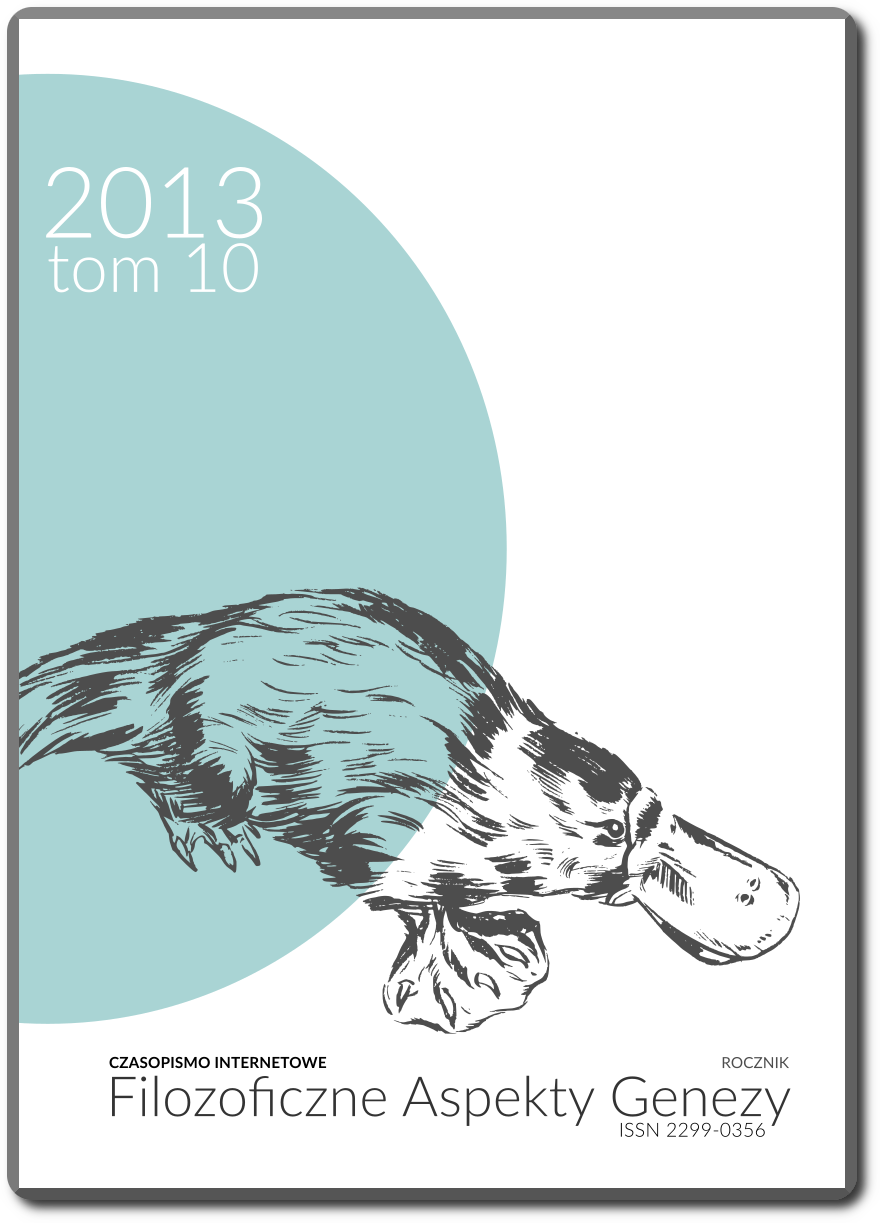Opublikowane 21.05.2021
Słowa kluczowe
- zło naturalne,
- zło moralne,
- wolna wola,
- teodycea augustiańska,
- teodycea ireneuszowa
- Bóg chrześcijański,
- Szatan,
- teoria ewolucji,
- teoria ciała jednorazowego użytku ...More

Utwór dostępny jest na licencji Creative Commons Uznanie autorstwa 4.0 Międzynarodowe.
Jak cytować
Abstrakt
Zdarzenia w rodzaju trzęsień ziemi i wyniszczających chorób często uważane są za coś złego i skłaniają do zadawania kłopotliwych pytań o Bożą dobroć. Chociaż nauka nie uznaje takich zdarzeń za złe, to jednak dostarcza pewnych wskazówek na temat ich pochodzenia. Teodycea podejmuje próbę teologicznego wyjaśnienia pochodzenia zła oraz celu, w jakim Bóg pozwala mu istnieć. Pytanie, czy ewolucja może być jednym z Boskich mechanizmów stwórczych, uzyskuje inną odpowiedź w świetle założeń teodycei augustiańskiej, a inną w ramach teodycei ireneuszowej. Uznając, że każda prawda jest prawdą Bożą, chrześcijanie starają się stworzyć pogląd na świat, który łączyłby naukowe i teologiczne spojrzenie na prowadzące do cierpienia zdarzenia przyrodnicze.
Downloads
Bibliografia
- Hick John, Evil and the God of Love, Harper & Row, New York 1966.
- Lewis Clive Staples, Problem cierpienia, przeł. Andrzej Wojtasik, Wydawnictwo Esprit, Kraków 2010.
- Willimon William H., Sighing for Eden: Sin, Evil, and the Christian Faith, Abingdon, Nashville, Tennessee 1985.
- Clark Robert E.D., The Universe: Plan or Accident?, Paternoster Press, London 1961.
- Harrison Peter, „Theodicy and Animal Pain”, Philosophy 1989, vol. 64, no. 247, s. 79-92.
- Wennberg Robert, „Animal Suffering and the Problem of Evil”, Christian Scholar’s Review 1991, vol. 21, no. 2, s. 120-140.
- Morris Henry M. and Clark Martin E., The Bible Has the Answer, rev. and expand. ed., Creation-Life Publishers, El Cajon, California 1987.
- Raven Peter H. and Johnson George B., Biology, 3rd ed., Mosby-Year Book, Inc., St. Louis, Missouri 1992.
- Schumann Gail L., Plant Diseases: Their Biology and Social Impact, APS Press, St. Paul, Minnesota 1991.
- Arking Robert, Biology of Aging: Observations and Principles, Prentice-Hall, Inc., Englewood Cliffs, New Jersey 1991.
- Hartmann Hudson T., Kester Dale E., and Davies Fred T., Plant Propagation: Principles and Practices, 5th ed., Prentice-Hall, Inc., Englewood Cliffs, New Jersey 1990.
- Brasier Clive M., „A Champion Thallus”, Nature 1992, vol. 356, no. 6368, s. 382-383.
- Kirkwood Thomas B.L., „Comparative and Evolutionary Aspects of Longevity”, w: Caleb E. FINCH and Edward L. Schneider (eds.), Handbook of the Biology of Aging, 2nd ed., The Handbooks of Ageing, Van Nostrand Reinhold Co., New York 1985, s. 27-44.
- Kirkwood Thomas B.L., „Evolution of Ageing”, Nature 1977, vol. 270, no. 5635, s. 301-304.
- Kirkwood Thomas B.L. and Rose Michael R., „Evolution of Senescence: Late Survival Sacrificed for Reproduction”, Philosophical Transactions of the Royal Society B: Biological Sciences 1991, vol. 332, no. 1262, s. 15-24.
- Kirkwood Thomas B.L., „The Origins of Human Ageing”, Philosophical Transactions of the Royal Society B: Biological Sciences 1997, vol. 352, no. 1363, s. 1765-1772.
- Kirkwood Thomas B.L., Czas naszego życia. Co wiemy o starzeniu się człowieka, przeł. Monika Kowaleczko-Szumowska, Wydawnictwo Charaktery, Kielce 2005.
- Bugalski Dariusz, „Skromni nosiciele genów (wywiad z Thomasem Kirkwoodem)”, Charaktery 2006, nr 1 (106), s. 52-54.
- Blocher Henri, In The Beginning: The Opening Chapters of Genesis, InterVarsity Press, Downers Grove, Illinois 1984.
- Wenham John W., The Enigma of Evil: Can We Believe in the Goodness of God?, 2nd rev. ed., Zondervan, Grand Rapids, Michigan 1985.
- Wenham John W., The Goodness of God, Zondervan, Grand Rapids, Michigan 1974.
- Plantinga Alvin, God and Other Minds: A Study of the Rational Justification of Belief in God, Contemporary Philosophy, Cornell University Press, Ithaca, New York — London 1967.
- Van Dyke Fred, „Theological Problems of Theistic Evolution”, Journal of the American Scientific Affiliation 1986, vol. 38, no. 1, s. 11-18.
- RICE Stanley, „On the Problem of Apparent Evil in the Natural World”, Perspectives on Science and Christian Faith 1987, vol. 39, no. 3, s. 150-157.
- Granberg-Michaelson Wesley, Ecology and Life: Accepting Our Environmental Responsibility, Issues of Christian Conscience Series, Word Books, Waco, Texas 1988.
- Rice Stanley, „Bringing Blessings Out of Adversity: God’s Activity in the Natural World”, Perspectives on Science and Christian Faith 1989, vol. 41, no. 1, s. 2-9.
- Murphy George L., „A Theological Argument for Evolution”, Journal of the American Scientific Affiliation 1986, vol. 38, no. 1, s. 19-26.
- Wilkinson Loren E., „A Christian Ecology of Death: Biblical Imagery and the Ecologic Crisis”, Christian Scholar’s Review 1976, vol. 5, no. 1, s. 319-338.



